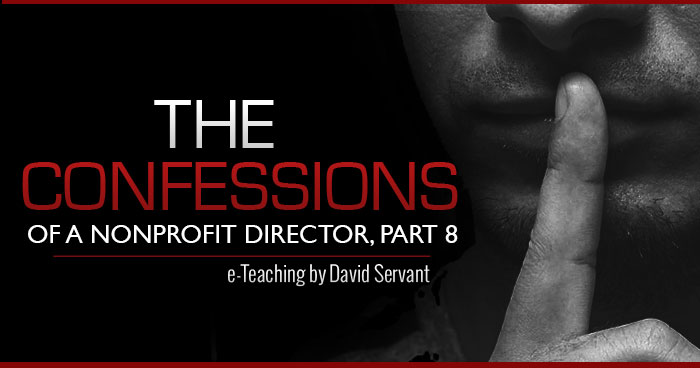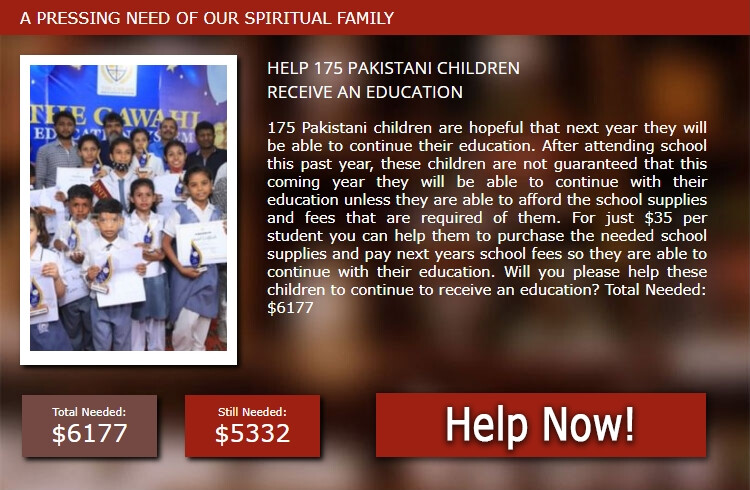One of the redemptive perks for doing something stupid is that it is much easier in the future to correct others who are making the same mistake. By simply talking about your own past foolishness, you can provoke others to ponder without pointing your finger.

I’ve been able, for example, to prick the consciences of thousands of pastors over the years by telling the story of my pastoral repentance (something I shared in Part 4 of this series). In that case, my problem was more than stupidity. It was plain disregard of Jesus’ words. The confession I’m about to make trends more to the “sincere but stupid” side.
In 2002, I traveled to Myanmar to assist an evangelist friend with an outdoor campaign and to teach Christian leaders. There I was introduced to several orphanages. I remember walking down a line of about 80 orphans, shaking each of their hands as they timidly whispered, “God bless you” with a Burmese accent. The children were all beautiful. I was told by my interpreter that they were all orphans, and that they had no financial supporters. The orphanage dormitory had been funded through Japanese war reparations, donated decades after World War II.
At another orphanage, 40 children were crowded into a tiny weathered, wood-frame house, and they slept like sardines on the floor each night.
It was impossible not to feel deep empathy for parentless children living in deep poverty, and I did the only thing I could do. I emptied my wallet, and I promised that if I could figure out a way to help them, I would. That promise ultimately lead to a child sponsorship program and an outreach of Heaven’s Family named Orphan’s Tear.
At our peak, we had about 1,000 sponsored children who lived in orphanages in eight nations. The majority lived in about 45 orphanages in Myanmar. We sent 100% of sponsors’ monthly donations to the orphanage where their sponsored child lived. We didn’t want anyone to be able to accuse us of exploiting poor children to finance a ministry.
Through many generous contributions, we bought land and funded the construction of scores of orphanage buildings in order to improve the lives of our orphans. Christians care about orphans, of course, and fundraising on their behalf was easy.
The Dawning of Reality
As I visited those orphanages year after year, however, questions began to arise. Some children were missing. When we asked their orphanage directors about this, we were told they had “gone to live with their relatives.” When we began collecting biographical information about all the children, we learned that, in many cases, one or both parents were still alive. Some of their parents had been divorced, and when their mothers remarried, their new husbands refused to support their existing children. So their mothers had placed them in orphanages.
In other cases, we learned that parents had placed their children in orphanages because of extreme poverty, or because there were no schools near their remote villages, and they wanted their children to receive an education, courtesy of an orphanage.
We eventually began seeing a very dark side to Myanmar’s orphanage scene that included “Christian” orphanage directors who sexually abused children under their care, intentionally misused funds that were entrusted to them for their orphanage ministry, and/or were known locally as drunks.
One orphanage director built a new dormitory using full funding from three ministries who knew nothing about each other—all three (including us) thought they were the sole funders.
Another director unashamedly admitted to gathering up children from remote villages for his orphanage so he could “train them for 15 years and send them back to their villages as evangelists.” (And you thought God was in charge of calling evangelists…)
Some directors had visions to house hundreds of children in their orphanages (and some succeeded).
One time we learned that one of the key persons in Myanmar who kept introducing us to new, needy orphanages was getting monthly kickbacks from most every orphanage we supported because of his introduction.
We even heard of “child agents” who traveled among remote Burmese villages collecting children for a fee that was paid by orphanage directors.
Not surprisingly, during the past 15 years that we’ve been serving in Myanmar, more and more pastors have been “called” to start orphanages. Plus, many Burmese Bible School graduates have “felt led” to open orphanages right after their graduation. It has become obvious to us that money is a huge driver in this phenomena, as orphanages are attracting donations from far and wide. Starting an orphanage has become a way to establish a financial base to do just about anything, and as Myanmar had continued to transition from military junta to democratic rule, it has become a “hot” short-term mission destination, with orphanage directors waiting at every airport for naive, cash-laden foreign guests.
Today, Myanmar’s orphanage industry is booming, all funded by well-meaning people like us who want to care for orphans, but who have unwittingly contributed to the breakup of families, and to the isolation, dysfunction, rejection, and abuse that children often suffer in orphanage settings. The negative outcomes of children raised in orphanages have been well documented (see Keeping Children out of Harmful Institutions by Save the Children, Families, Not Orphanages by Better Care Network, The Science of Neglect by Centre on the Developing Child at Harvard University, Ending the Institutionalisation of Children Globally by Lumos).*
There are, of course, small orphanages around the world that are more like foster families, and whose directors truly love their children as their very own. We thank God for those. However, in summary, it became painfully obvious to me that, generally speaking, orphanages were not a good solution to a problem, but rather a solution that was creating problems. But what could we do to fix the problem we were helping to create?
God Sends a Man
As I sought for answers, I noticed that many other Christian organizations that supported orphanages had also discovered the same hard truths. And although many had identified the problems—to the degree that they even used terms such as “half orphans,” “full orphans,” and “poverty orphans”—they didn’t have solutions.
It was about that time that God sent the answer. During an international trip, I stopped over in London for a couple of days to meet with the trustees of Heaven’s Family U.K. At a reception at the home of one of those trustees, I was talking to a businessman about our ministry to orphans, and he told me he had a friend who also had a ministry to orphans, but it centered around reintegrating orphanage children back with their families or foster families.
Within minutes, I was on the phone with Mick Pease, director of Substitute Families for Abandoned Children (SFAC). Mick had been a career social worker in the U.K. whom God called to advocate on behalf of the millions of abandoned and orphaned children all over the world. He was an expert on everything related to orphans, orphanages, foster care, kinship care and adoption. His premise was simple: God intended for children to be raised in families, so we should not settle for anything less.
God had opened doors around the world for Mick to influence orphanage directors, NGOs and even governments, equipping them with knowledge and tools to implement family-based care solutions that have, in many places, replaced orphanage and institutional care. I learned that foster care and adoption can be implemented in poor countries where such practices have previously never existed. Wonderful things were happening. When I talked to Mick, I knew we’d found the person we needed to help us escape our predicament and do what was actually best for the children whom we were trying to help.
One of the first things we did was invite Mick to teach at some conferences we hosted in Myanmar for all the orphanage directors whom we were sending money to each month. They had many objections to what Mick presented (and they verbalized all of them except one, which was, But if we do what you say, our orphanages will be shut down and we will lose our source of income!) Mick had gentle, respectful, and persuasive answers to every objection.
We implemented a plan to gradually stop financially supporting orphanages, to reduce their populations, and ultimately only continued supporting those orphanages in Myanmar whose directors agreed to work with us to reintegrate their orphanage children back with their families, relatives or good foster families. Sadly, only a minority of orphanage directors were willing to cooperate with us. Many just assumed they could find other naive Christians and Christian organizations to finance their orphanage schemes. And they assumed rightly.
Thankfully, there are orphanage directors in Myanmar and elsewhere who started their orphanages with the purest of motives, and those pure motives have guided them to genuinely seek what is best for children, which everyone intuitively knows is family care. Every orphanage director whom I’ve asked, “If you and your spouse died, would you want your children to be placed in an orphanage or with a loving family?” have answered “a loving family” without hesitation.
We’ve also partnered with child reintegration ministry experts from Australia, hired professional Christian social workers in Myanmar, and sent Philip Barker, who directed Orphan’s Tear U.K. and whose heart is greatly burdened for children in orphanages, to live in Myanmar (with his wonderful wife, Sandie) in order to oversee our efforts there. Philip and Sandie are doing a great job. The result is that orphanage children are going home. (For more information, view a video presentation by Stephen Servant, director of our Orphan’s Tear Ministry, by clicking here.)
We’ve also launched efforts—in conjunction with our Micro-Loan Ministry—to help poor parents prosper so they can bring their children back from orphanages. We are also encouraging them to collaborate with other prospering parents to establish primary schools in their villages.
So this confession has a happy ending. And whereas our goal at one time was to financially support every Christian orphanage in the world, our goal now is a world without orphans or orphanages. Every child belongs in a loving family.
Tragically, our greatest adversary is not the secular world. In fact, the secular world is embracing, at a very fast pace, the superiority of family-based care over orphanage care. Our greatest adversary has proven to be Christian ministries that are intent on supporting orphanages, thus providing incentives for their continuation and proliferation, which perpetuates what everyone knows is not best for the children. Of course, many of those who lead such ministries are simply ignorant, just as I was at one time. Sadly, however, some are not ignorant. Instead, their desire to keep finances flowing into their ministry machines through child exploitation takes precedence over helping the very ones they claim to care about.
Thankfully, however, the tide is turning in the orphanage industry and those who bankroll it. If you know of any ministries that are still going against that tide, you can help them by sending this e-teaching to their directors. Hopefully that will result in a little more redemption of my own stupidity! — David
*
Keeping Children out of Harmful Institutions by Save the Children
Families, Not Orphanages by Better Care Network
The Science of Neglect by Centre on the Developing Child at Harvard University
Ending the Institutionalisation of Children Globally by Lumos

